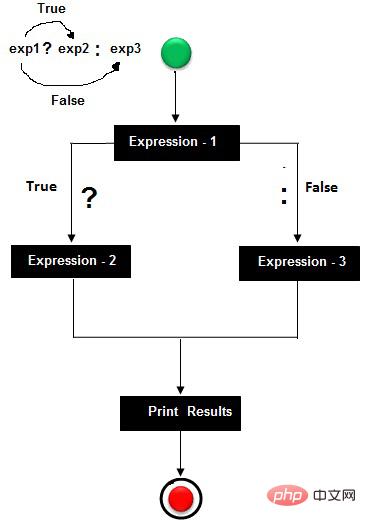Home >Common Problem >What is the use of ternary operator in c language
The ternary operator is also known as: ternary operator and conditional operator. It is used to execute code based on the result of a binary condition. It can effectively reduce the number of lines of code and improve the performance of the application.

Ternary operator in c language
The ternary operator has the following form:
表达1?表达2:表达3
Description: Expression 1 represents the condition, Expression 2 and Expression 3 will be values or variables or statements or any mathematical expressions. If expression1 evaluates to true, expression2 will be executed, otherwise expression3 will be executed.
Example:
a < b ?printf (“最小值为:a” ):printf (“最小值为:b”);
If the result of (a
Flowchart:

Description: The ternary operator takes a binary condition as input, making it similar to an "if-else" control flow block . However, it also returns a value and behaves like a function.
Example of using ternary operator
#include<stdio.h>
int main() {
int a, b, max;
printf("输入任意2个数字: \n");
scanf("%d%d", & a, & b);
/* Following statement replaces the whole if-else statement and makes the code more concise*/
max = (a > b) ? a : b;
printf("最大数字是:%d", max);
return 0;
}Output:
The above is the entire content of this article, I hope it will be helpful to everyone's study. For more exciting content, you can pay attention to the relevant tutorial columns of the PHP Chinese website! ! !
The above is the detailed content of What is the use of ternary operator in c language. For more information, please follow other related articles on the PHP Chinese website!